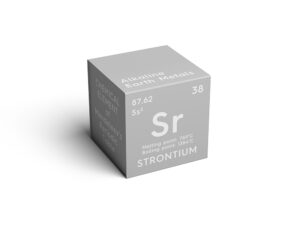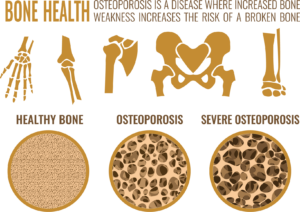STRONTIUM IS KEY TO STOPPING OSTEOPOROSIS
Osteoporosis is reaching a crisis point as our population ages, and as poor diets do nothing to improve or strengthen healthy bones.
Prescription measures are not only less effective than taking a natural course, but they may be potentially dangerous. A better plan is to make sure your patients are getting the right minerals that assist the natural process of building strong, healthy bones. One of the best nutrients for ensuring that is strontium. It’s not as well-known as calcium, but including strontium in a bone-building protocol will:
- Boost bone density
- Reduce fracture risk
- Prevent weak, brittle bones
- Reinvigorate healthy bone growth
- Help prevent osteoporosis
Osteoporosis: Common, but Not Inevitable
It’s very likely that at least a percentage of your patients are dealing with osteoporosis. This imbalance in the normal growth cycle of bones and a lack of fresh minerals being added to the bone matrix ultimately results in bones becoming weak, brittle, and prone to break.
According to the National Osteoporosis Foundation, over 10 million Americans have osteoporosis, and 44 million have low bone density. The loss of mobility and increasing brittleness of bones is a dangerous situation as people age. Unfortunately, prescription drugs often only make the problem worse.
For example, one pill per month of bisphosphonate drugs that were formulated to be a convenient way to battle osteoporosis is based on a flawed idea of bone building. While they initially stop minerals from leaving bones, these drugs also stop the process that signals the body to build new bone. The end result is that bones may actually be more brittle and prone to fractures. Bisphosphonates are also known to cause diarrhea, back pain, headaches, and even fractures of the femur – normally one of the strongest bones in the body.
But while osteoporosis is not unusual, it is not inevitable, either. With a proper diet, exercise regimen, and nutrient protocol, your patients can stop bone loss, build healthy bones, and reduce their risk of injury and fractures.

A Healthy Diet Delivers the Proper Foundation
One way you can encourage your patients to preserve healthy bones and avoid bone loss is through their daily habits, including carefully considering the foods they eat. One of the ways patients can help maintain bone density is by being aware of their intake of alkaline foods.
Even though the body does a remarkable job of keeping an acid/alkaline balance fairly even, there are reasons to believe a diet rich in alkaline foods and fruits and vegetables can help.
While lean whole proteins are important to ward off osteoporosis and keep muscles strong, patients should avoid cured meats, excessive salt intake, refined carbs, sugar, and soft drinks.
Exercise is a Must for Active Bone Building
Being active is a must for staying healthy in body and mind, and this is as much true for bone density as it is for anything else. The actions of muscles and bones essentially help build each other and keep each other strong. Bones and muscles need weight-bearing exercises, brisk walks, and flexibility-maintaining workouts like Pilates or yoga.
Of course, the recommended intensity is going to vary depending on the ability and overall health of each patient, some form of activity is a requirement to keep as much mobility and strength as possible, especially for older patients. Strontium, a Key Mineral for Strength
Strontium, a Key Mineral for Strength
Calcium, vitamin D, and magnesium are essential bone-building nutrients, and should have a place in any bone-strengthening regimen. But the mineral that may be easily overlooked is strontium. It doesn’t have the name recognition of calcium, but it is incredibly important.
In fact, high levels of calcium are not always productive and, without partner nutrients to help the mineral absorb into the bone matrix, too much calcium can cause cardiovascular and renal complications. It’s better to have a moderate intake of calcium and magnesium plus other nutrients that increase their absorption and effectiveness. And strontium is one of them.
Strontium (not to be confused with strontium 90, a radioisotope of strontium) can have a tremendous effect on bone density. In fact, it can fight, and possibly even prevent, osteoporosis.
Supplemental forms of strontium have been safely used as a medicinal substance for over 100 years. As late as 1955, strontium compounds were still listed in the dispensary of the United States of America and were used therapeutically here and in Europe.
Clinical studies have found that strontium can help build the density in the vertebrae, so supplemental strontium every day may be exactly what your patients struggling with osteoporosis or at risk need most.
Mayo Clinic researchers noted clinical and x-ray improvement in cases of severe osteoporosis following treatment with strontium lactate. Other work has reported significant microscopic improvement in bone with the use of strontium carbonate.
The results of a three-year randomized, double-blind, placebo-controlled study using two grams of strontium daily were published in the New England Journal of Medicine, and they were impressive: women suffering from osteoporosis experienced a 41 percent reduction in risk of a vertebral fracture compared to the placebo group. Overall vertebrae density in the strontium group increased 6.8 percent but there was a 1.3 percent decrease in the placebo group.
Additionally, clinical work has found that strontium can help those with knee osteoarthritis as well. Both arthritis and weakening bones are two conditions that are a common risk as people age, so there are good reasons for adding strontium to your patients’ regimens – whether or not they are currently diagnosed with osteoporosis.
For the most readily absorbed form of strontium, you may consider recommending strontium citrate – it can most easily be used by the body.

Building Healthy Bones is a Continual Project
The body requires a team of nutrients to build healthy bones. Calcium certainly is one of them, but it is far from the only one. Adding strontium to a bone-building regimen is safe and effective. The participants in the studies using two grams of strontium per day experienced no significant side effects. In fact, if there is any concern about using strontium, it is that it should be taken separated by at least two hours from any calcium-containing supplement, because they both compete for the same absorption pathways.
So by all means, recommend calcium and its partner nutrients. But also consider recommending strontium to help your patients in their battle against osteoporosis and to help their bones become stronger each day.


